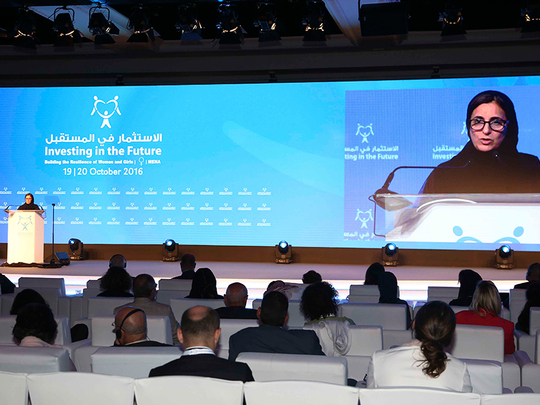
Dubai: The United Nations Entity for Gender Equality and the Empowerment of Women (UN Women) announced the adoption of the ‘Sharjah Declaration’ that aims to strengthen the resilience of women and girls in the Arab region, at the closing session of the Investing in the Future Conference on Friday.
The ‘Sharjah Declaration’ was announced with the blessings of His Highness Dr Shaikh Sultan Bin Mohammad Al Qasimi, Supreme Council Member and Ruler of Sharjah, and Shaikha Jawaher Bint Mohammad Al Qasimi, Shaikh Sultan’s wife, Chairperson of The Big Heart Foundation (TBHF) and Chairperson of NAMA Women Advancement Establishment.
The second edition of the two-day conference was held under the theme ‘Building the Resilience of Women and Girls in the Arab Region’, organised by TBHF and UN Women.
Shaikha Jawaher lauded efforts by representatives from government and nongovernment organisations, as well as representatives from UN organisations and civil bodies who contributed to drafting the Sharjah Declaration, which aims to strengthen the resilience of women and girls in the Arab region.
Shaikha Jawaher said: “Most principles stipulated in the Sharjah Declaration focus on the involvement of women and girls in promotion of peace and achieving stability, which is an extremely important issue amid the difficult conditions experienced by many countries in the region. This is because the lack of security threatens women’s mental and physical integrity and hinders them from becoming an active agent designing the future to ensure sustainable development and prosperity.”
Shaikha Jawaher called for the collection and analysis of data and statistical indicators on women’s participation in economic development in the Middle East, to promote women’s roles in business sectors.
Shaikha Lubna Al Qasimi, Minister of State for Tolerance, said the UAE has gone far in empowering women, quoting His Highness Shaikh Mohammad Bin Rashid Al Maktoum, Vice-President and Prime Minister of the UAE and Ruler of Dubai: “We have moved beyond the phase of empowering women. Indeed, we are empowering society through women. This is reflected in the constant and consistent achievements made by the nation’s women. The UAE ranks first globally for treating women with respect, according to the World Economic Forum Report 2013, and also leads the Middle East and North Africa in terms of gender equality. A perfect illustration of the empowerment and social confidence in women and girls of all ages is the success of a number of Emirati girls who recently managed to conquer the Everest.”
Shaikha Lubna underlined that the country’s focus on supporting women is not limited to the local arena, as the UAE is also keen, under the guidance of its wise leadership, to help other countries promote gender equality. “Emirati women enjoy more than mere encouragement, because government legislation and laws provide a broad scope of official and tangible support for women. This is well illustrated by the Cabinet ruling four years ago that all boards of directors of companies and government entities must include women, making the UAE only the second country after Norway that has made the representation of women on boards mandatory,” she said.
“Supporting women entrepreneurs is a pillar to spur economic growth, since women’s entrepreneurial potential and capabilities have not yet been fully utilised. Women entrepreneurs can play a prominent role in leading the economy and in doing so, create jobs for themselves and others. This is why we should increase women’s abilities to participate in the workforce and strengthen their participation in entrepreneurial activities,” she said.
“Efforts must also be made to improve these targeted efforts through collecting more consistent data for the study of women’s employment and entrepreneurship that can be run from home,” she added.
The conference was attended by representatives of states, governments, international organisations and civil society institutions.







